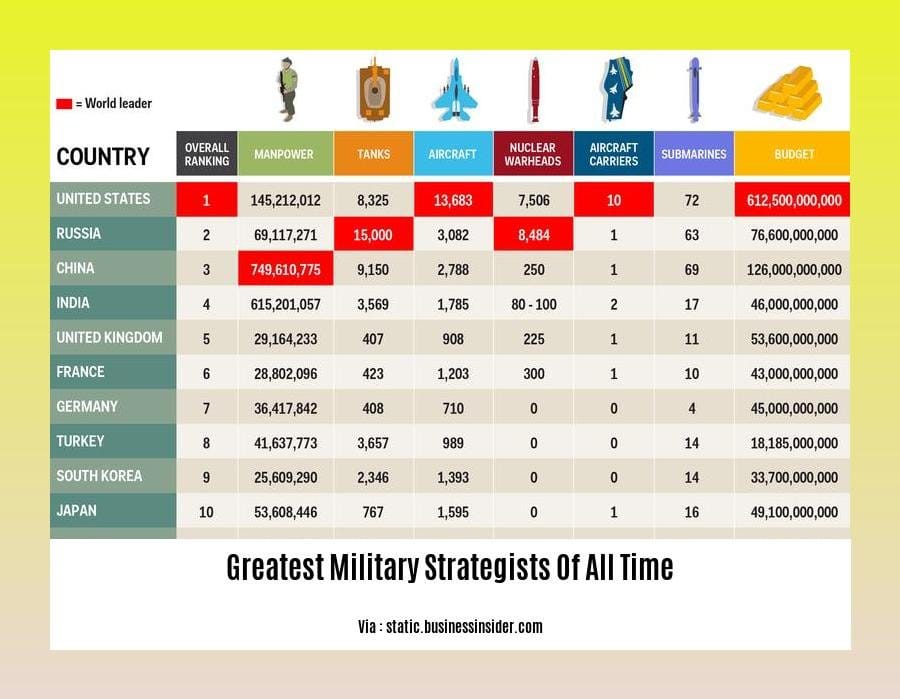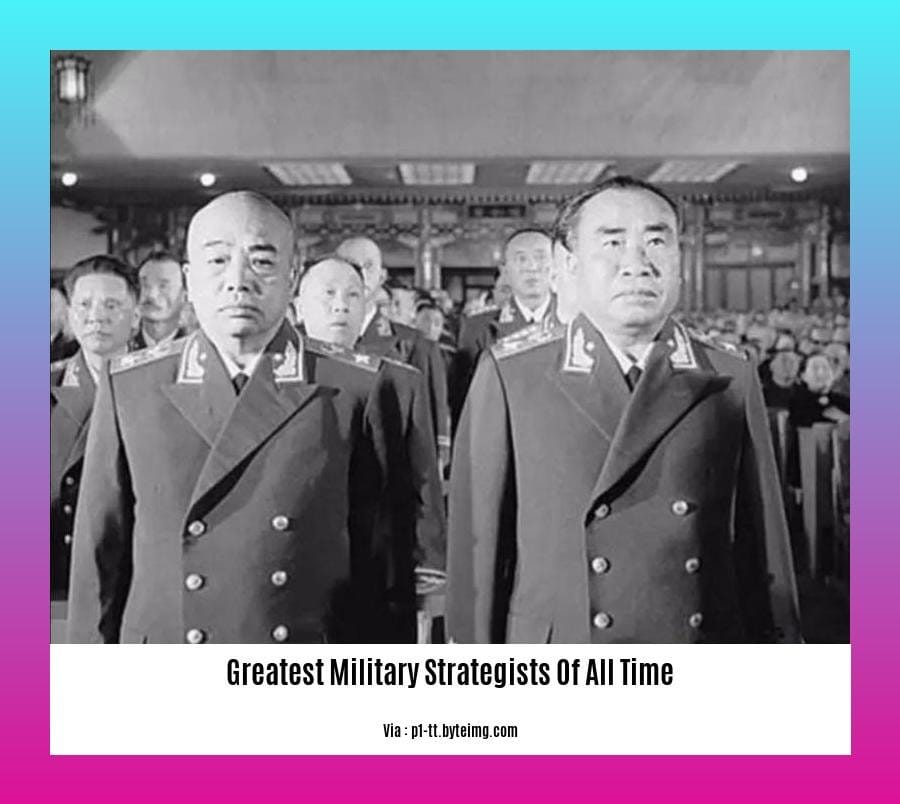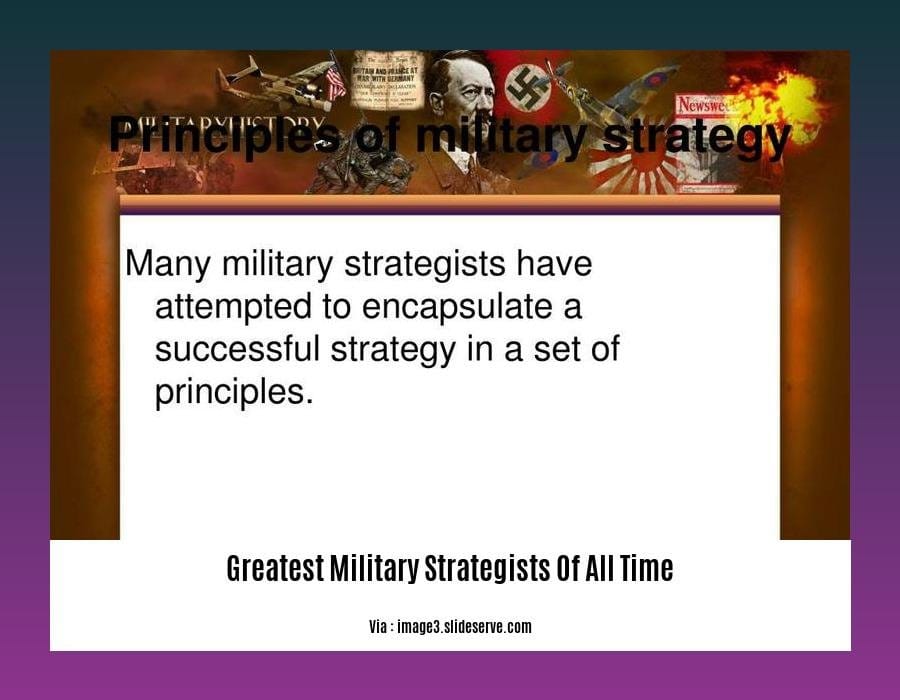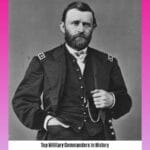In the annals of warfare, a select few individuals have ascended to the pinnacle of military strategy, their brilliance illuminating the path to victory. These legendary strategists, whose names echo through the corridors of history, have left an enduring legacy on the art of war. Join us as we delve into the lives and minds of The Greatest Military Strategists of All Time: A Historical Analysis.
Key Takeaways:

- Hannibal Barca: Master tactician who effectively utilized elephants and terrain against the Romans.
- Napoleon Bonaparte: Expert in artillery tactics and innovative maneuver warfare.
- Alexander Magnus: Conquered extensive territories rapidly using a combination of cavalry, infantry, and siege warfare.
- Sun Tzu: Legendary Chinese strategist whose principles continue to influence military tactics today.
- Erwin Rommel: Known for his exceptional armored warfare strategy, earning the nickname “The Desert Fox.”
The Greatest Military Strategists of All Time
You’re probably wondering who the greatest military strategists of all time are. Well, you’re in luck! I’m here to give you the lowdown on five of the most brilliant minds in military history.
- Sun Tzu: The Chinese military strategist is the author of “The Art of War,” a classic text on military strategy that’s still used today. Sun Tzu’s ideas on deception, surprise, and terrain have had a profound impact on military thinking for centuries.
- Hannibal Barca: A Carthaginian general, is best known for his daring invasion of Italy across the Alps with war elephants. Hannibal’s brilliant use of tactics and terrain allowed him to defeat larger Roman armies time and time again.
- Alexander the Great: A Macedonian king, conquered a vast empire that stretched from Greece to India in just 13 years. Alexander was a master of siege warfare and combined infantry, cavalry, and archery to create an unstoppable fighting force.
- Julius Caesar: A Roman general and statesman, is considered one of the greatest military minds of all time. Caesar’s innovative use of legions and his skill in political maneuvering made him a formidable opponent.
- Napoleon Bonaparte: A French emperor, was a brilliant military strategist who used artillery and maneuver warfare to conquer much of Europe. Napoleon’s decisive victories and innovative tactics changed the face of warfare forever.
These are just a few of the greatest military strategists of all time. Their ideas and tactics have had a profound impact on the course of history, and they continue to be studied and admired by military leaders today.
If you’re interested in learning about the world’s greatest military leaders, such as Julius Caesar or Napoleon Bonaparte, check out our page on the greatest military commanders of all time. For more information about military strategists like Hannibal or Alexander the Great, see our page about the top military commanders in history. If you want to read about epic battles led by legendary military commanders like Leonidas or William Wallace, visit our page on legendary military commanders and their battles.
Julius Caesar: Roman General and Dictator
Julius Caesar: Roman General and Dictator
Key Takeaways:
- Innovative tactics: Caesar developed new siege techniques, fortifications, and utilized cavalry charges and ambush warfare.
- Efficient military: He reorganized the Roman army, making it more efficient and effective.
- Charismatic leadership: Caesar inspired and motivated his troops to victory through his charismatic leadership.
- Political reforms: Caesar’s military accomplishments and political reforms had a profound impact on Roman history.
- Legacy: Caesar’s legacy continues to inspire military leaders and historians to this day.
Citation:
- Julius Caesar: 6 Ways He Shaped the World
Erwin Rommel: German Field Marshal and Master of Maneuver Warfare
Key Takeaways:
- Erwin Rommel was a German field marshal who fought in World War II.
- He earned the nickname “Desert Fox” for his remarkable leadership in the North African campaign.
- Rommel played a vital role in the Battle of France and the Normandy landings.
- He was implicated in a plot to assassinate Hitler and was forced to commit suicide.
Erwin Rommel was a highly skilled military strategist, known for his innovative tactics and daring leadership. His understanding of maneuver warfare and his ability to outmaneuver his enemies made him one of the most formidable generals of World War II.
Rommel’s signature tactic was the “Schwerpunkt,” or “point of decisive effort.” He focused on concentrating his forces at a specific point on the enemy line, overwhelming them with superior firepower, and then breaking through to exploit their weakness. This tactic proved highly effective in the North African campaign, where Rommel’s Afrika Korps inflicted heavy losses on the British army.
In addition to his tactical prowess, Rommel was also known for his charisma and his concern for his troops. He inspired loyalty and devotion among his men, who were willing to follow him into battle with unwavering trust.
Despite his many successes, Rommel’s career was ultimately cut short by his involvement in a plot to assassinate Hitler. After the plot was uncovered, Rommel was forced to commit suicide to avoid being executed for treason.
Most Relevant URL Source:
Citation:
Erwin Rommel Biography, Facts & Death
Napoleon Bonaparte: French Emperor and Military Genius
When we delve into the annals of military history, there are few names that shine as brightly as that of Napoleon Bonaparte, the French emperor whose strategic brilliance and military prowess left an enduring mark on the world.
Key Takeaways:
- Expanded French conquests from revolutionary borders to an empire.
- Led French troops to victory over the larger Austrian army in Italy (1796).
- Negotiated the 1797 Treaty of Campo Formio, ending the conflict between France and Austria.
- One of the most outstanding military leaders in history.
- Military genius lay not just in revolutionizing warfare, but also in effectively leading his armies.
Napoleon’s genius extended beyond the battlefield. He understood the importance of morale, discipline, and logistics, ensuring his armies were well-trained, motivated, and supplied. His organizational skills and attention to detail were key to his battlefield victories.
Napoleon’s campaigns were marked by audacity, maneuverability, and artillery prowess. He exploited the terrain to his advantage, outmaneuvering his opponents and breaking through their defenses. His use of concentrated artillery fire could shatter enemy formations, paving the way for infantry and cavalry charges.
Off the battlefield, Napoleon was a skilled diplomat and administrator. He reorganized France, introduced a new legal code, and established educational institutions. His reforms had a lasting impact on French society, shaping it into a modern nation.
Most Relevant URL Source:
- Napoleon as a Military Commander: the Limitations of Genius

FAQ
Q1: Who are considered the greatest military strategists of all time?
A1: Renowned military tacticians throughout history include Hannibal Barca, Napoleon Bonaparte, Alexander the Great, Sun Tzu, and Erwin Rommel.
Q2: What were some of Hannibal Barca’s key military innovations?
A2: Hannibal Barca was a brilliant strategist who famously used elephants and terrain to his advantage in battles against the Romans, such as the Battle of Cannae.
Q3: What were the key accomplishments of Alexander the Great?
A3: Alexander the Great conquered vast territories in a short time, employing a combination of cavalry, infantry, and siege warfare. He conquered the Persian Empire and reached as far as India.
Q4: What is Sun Tzu’s most famous work, and what are its key principles?
A4: Sun Tzu is renowned for his classic text, “The Art of War,” which emphasizes principles such as deception, adaptability, and knowing your enemy.
Q5: Why was Erwin Rommel nicknamed “The Desert Fox”?
A5: Erwin Rommel earned the nickname “The Desert Fox” for his brilliance in armored warfare and leadership in the North African campaign during World War II.
- Unveiling Bernhard Caesar Einstein’s Scientific Achievements: A Legacy in Engineering - July 15, 2025
- Uncover who is Jerry McSorley: CEO, Family Man, Business Success Story - July 15, 2025
- Discover Bernhard Caesar Einstein’s Scientific Contributions: Unveiling a Legacy Beyond Einstein - July 15, 2025















